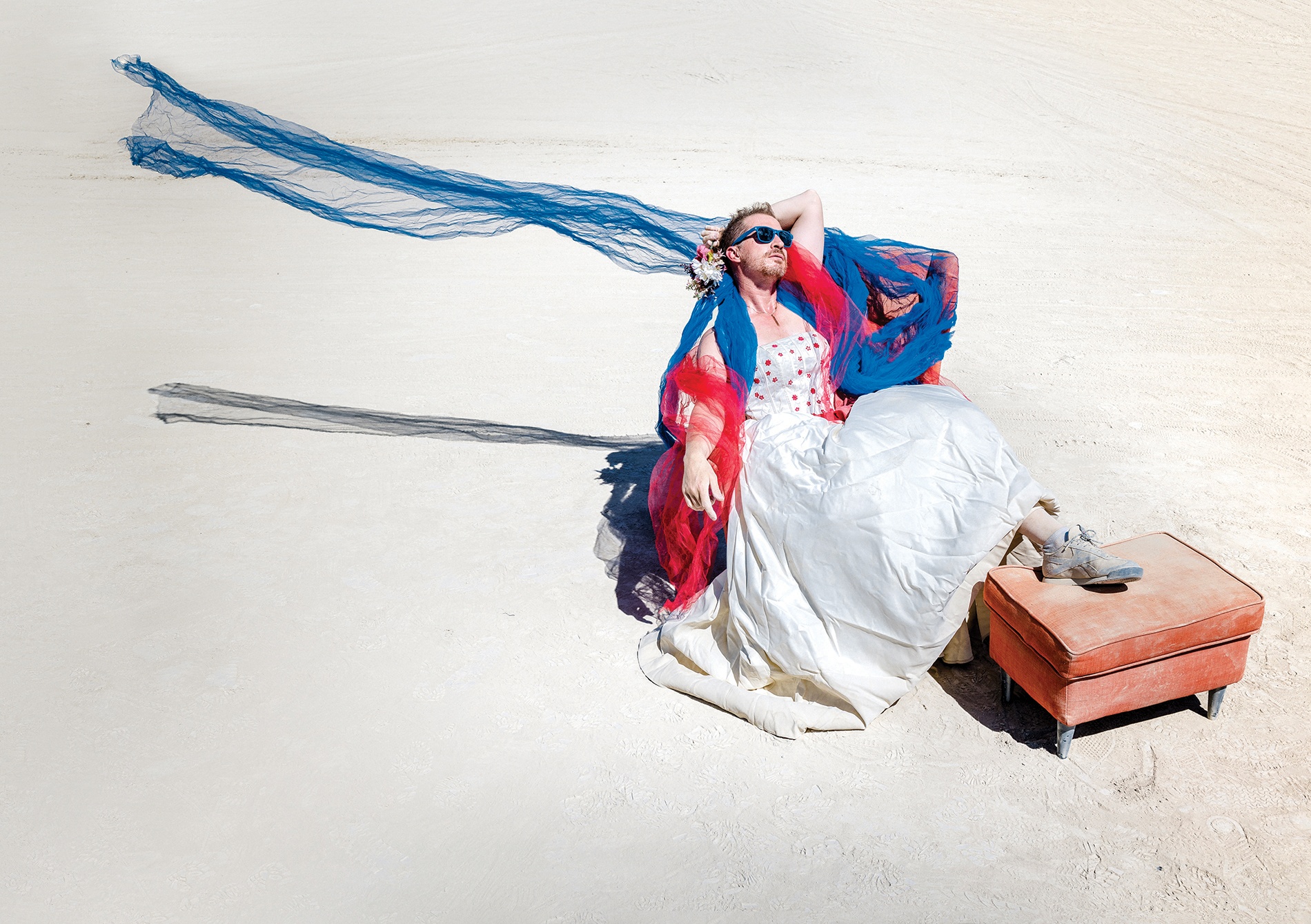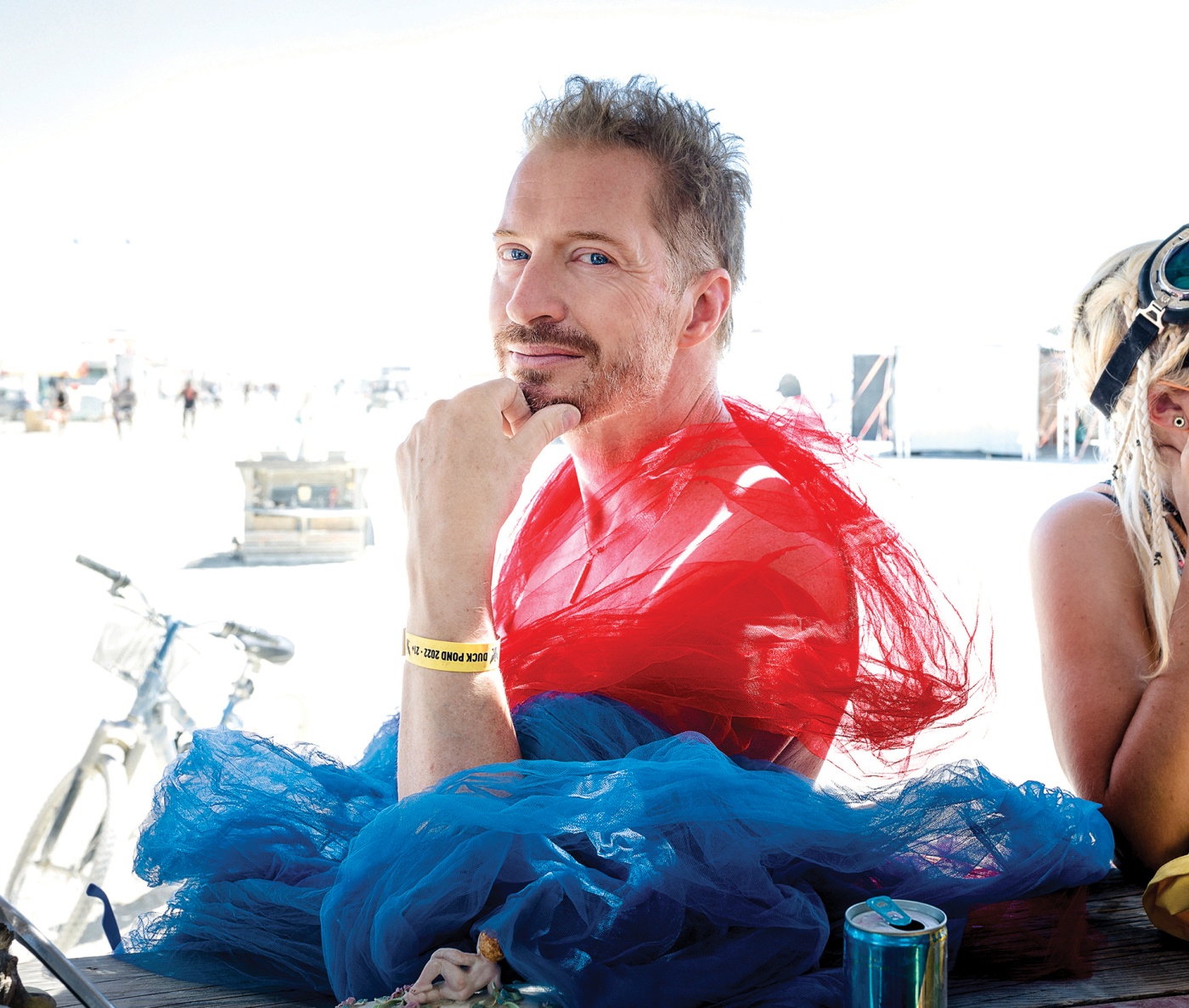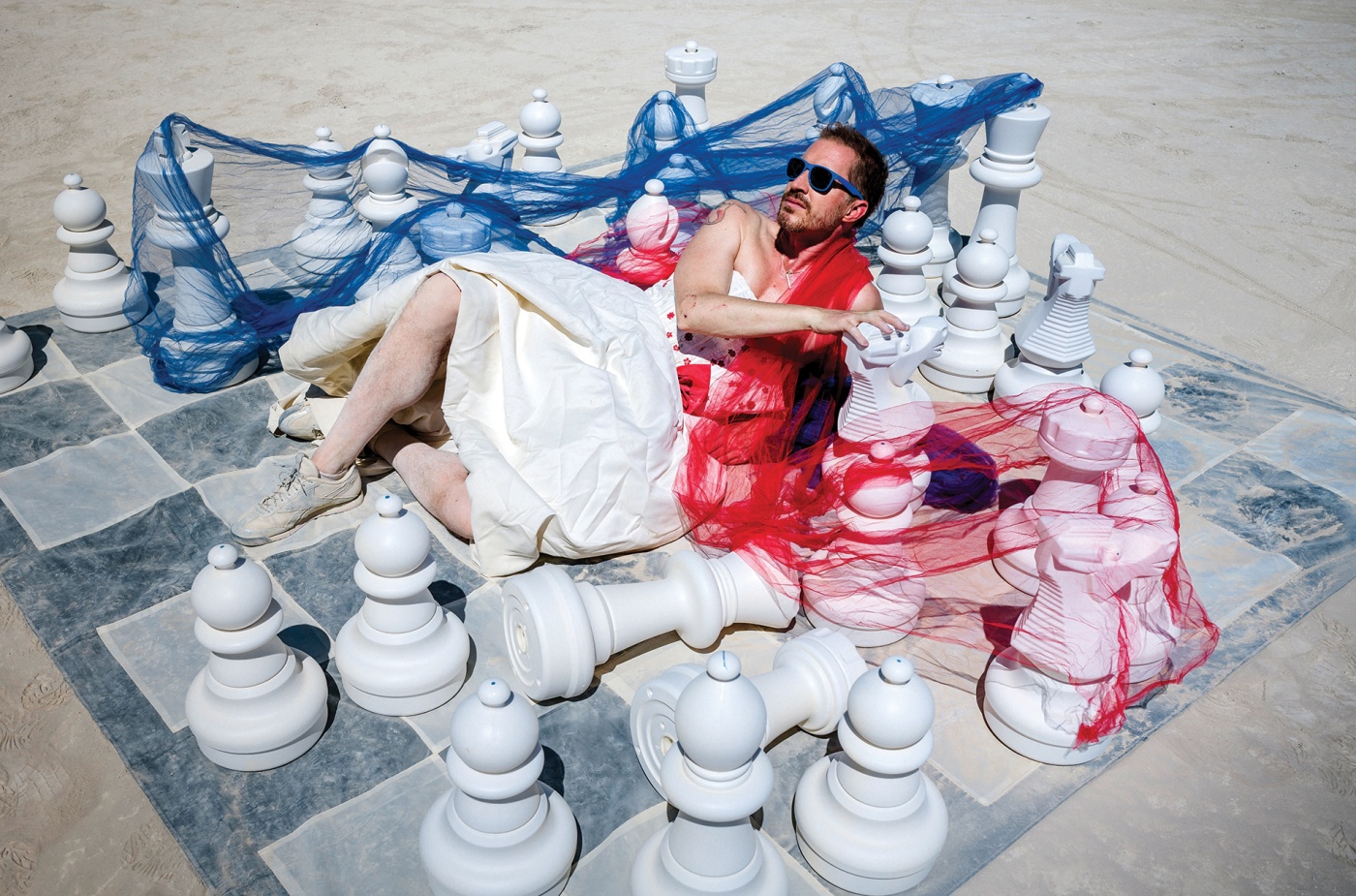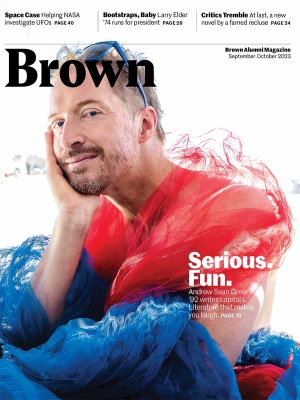
Less Rules. More Fun.
Andrew Sean Greer ’92 blazed a path to the Pulitzer by breaking literary rules with protagonist Arthur Less. Now Less Is Lost—and readers are loving it.
“OMG I won the Pulitzer Prize?” Andrew Sean Greer ’92 tweeted from Tuscany on April 17, 2018, where he was running a writer’s residency. “I […] had just persuaded a dog to let me put her into polka dot pajamas (not my dog) when I heard the news. I didn’t believe it. So I called my friend Michael Chabon, who screamed.”
Over the preceding two decades, Greer had published four critically praised novels, including 2003’s The Confessions of Max Tivoli and 2014’s The Impossible Lives of Greta Wells, but as Greer self-deprecatingly puts it: “No one was reading me!” Until his fifth novel, Less, won the big prize.
“I went and drank a lot of red wine,” his Pulitzer-day tweets continued. “I hope somebody put some money on me because they have surely made a fortune now.”
It wasn’t faux modesty—Less had the odds stacked against it. For one, the peripatetic protagonist, Arthur Less, is gay. “When I first got an agent,” Greer remembers, “he said, ‘Don’t ever write gay characters because they’ll never be placed in the general fiction section.’” It was accurate advice at the time. “Even my first two or three books that simply had gay characters—the books were put in the gay fiction section, not general fiction,” Greer says. “That’s just how it was.”
For another thing, Less is funny. Really funny. And Pulitzer judges are generally not amused. “Hardly anyone can think of a winner that was comedic,” Greer says. “There was A Confederacy of Dunces, but that was over 40 years ago. I guess I think that it just comes down to the like, three people on the jury who felt a certain way about the book. Perhaps they saw something in the character that just really spoke to them.”
Five years later, Greer is breaking the rules again, with his newest novel, Less Is Lost. That’s right, it’s a—you can just feel the literati’s lips curling as they say it—sequel. Also “wildly, painfully funny,” according to none other than David Sedaris.
“My agent definitely told me not to,” Greer says. “It’s sort of unseemly. You know, it’s a Pulitzer Prize-winning novel and you don’t write a sequel to that. And I didn’t want to! I didn’t want to write a sequel! But Less was still in my head, and I knew I could do more because it was just so fun.”
“I didn’t want to! I didn’t want to write a sequel! But Less was still in my head, and I knew I could do more because it was just so fun.”
Greer’s rule-breaking dates back to Brown. The English and creative writing concentrator was chosen to be a commencement speaker, together with Alaraby Johnson ’92. Their speech was called “Sonata for Two Bags, Packed” and encouraged staying flexible and free, says Greer. Right in line with the University’s Open Curriculum talking points. “We began our speech, however, with unapproved remarks about the hard time for students of color and queer students,” Greer says, “and we criticized Brown’s then policy of ‘need-aware’ admissions. It caused a semi-riot! But we were RIGHT!”
The voracious reader grew up with an identical twin brother in Rockville, Maryland. “I would read whatever was on our shelf, everything from Judy Blume books to science fiction like Watership Down, and even super-old fashioned stuff like The Railway Children,” says Greer. He began writing his own stories when he was 10. In the sixth grade, he started a school newspaper (The Sixth Grade Sentinel!) and at 16, he wrote a novel. (That one remains unpublished.)
After studying with luminary authors and Brown professors Edmund White and Robert Coover, Greer moved to New York City and took a series of random, often menial jobs to support his writing habit. Highlights included being an extra on Saturday Night Live—a hook-up from a fellow Brown alum, Ryan Shiraki ’92, who was working there. “The gig paid about $100 a pop and given that my rent was $600 at the time, that got me part of the way there.” He worked as a driver for an SNL writer who had a home in Scarsdale she was remodeling. “I also helped fetch rugs and other furnishings for her.” He was a restaurant receptionist for a time and even did light and sound tech for a theater on Ludlow Street. “I was writing on the side and actually had this idea in my head that I didn’t want to get a job that was a ‘writing job’—because then I might end up doing that forever. But luckily, no one would hire me for that.”
After a few years, he traded Manhattan for Missoula to get his MFA at the University of Montana. He soon ventured farther west, to Seattle, landing a writing job at Nintendo Power magazine, where playing hours of video games was a requirement. Eventually, he found his way to San Francisco—the home of Arthur Less and many other of Greer’s main characters—where all his years of writing finally resulted in his first big “yes” from the publishing establishment for The Path of Minor Planets, which came out in 2001.

In 2014, Greer began writing a book about a gay writer, Arthur Less—floundering in midlife, struggling to make sense of his middling career and stagnant love life, and feeling mired in melancholy. Unfortunately, Greer couldn’t ignore the fact that the book felt like a tale worthy of the world’s tiniest violin; Less just wasn’t coming off all that sympathetic. Until it occurred to him to make it funny, to add much more of Greer himself to the endeavor, from his own prodigious, quick wit to versions of experiences he’d had in his life. And, since he’d also branched out into travel writing—harnessing his storytelling power to help fund trips all over the world for magazines such as Travel+Leisure—Greer was able to send Less on adventures in locations including Japan, Morocco, and India, as Less sets off on a journey around the world (in part to avoid the emotional discomfort of his ex-lover’s impending wedding).
Along the way, Greer pokes a bit of fun at some of the absurdities of the business of being an author. Less cringes at the self-promotional churn of industry puff-ups: literary awards, book events, teaching jobs, and writer’s retreats. It’s at least semi-autobiographical, as Greer has taught at the famous Iowa Writer’s Workshop, amongst many other honors.
But as deep as Greer himself was in the author industry, he retained his inner fanboy and sense of being an outsider. On the day of the Pulitzer win, the phone kept ringing as literary superstars like Jhumpa Lahiri, Michael Chabon, Donna Tartt, and Michael Cunningham reached out to congratulate him. It was “a feeling of huge relief,” Greer remembers—“that I never had to go to a New York party again and try to figure out who might be able to help my career and to fail at doing that. I never had to do that again. I never could do that anyway. To have [these] previous Pulitzer winners reach out to me, it was stunning—to be sort of accepted by people who were just names on books to me.”
Losing Less
Despite the post-Pulitzer warnings, Greer felt he just had to return to Arthur Less. “Plus, I wanted to do a road trip across America and I figured I could take characters I already had. Whenever I write a book I have some sort of come-to-Jesus moment where I have to realize the book is gonna go this way and it’s not always the way I planned.”
“Within [a] funny story is often something really sad or humiliating, and it’s easier to get to that sad part than if I’d simply written it as entirely sad.”
It was quite an unusual time to hit the road. “Trump had won the election and I thought ‘I don’t understand this country.’” So Greer set off on a cross-country road trip for a few weeks in a rented RV, zigzagging throughout the Southwest and then into the Deep South, to see if he could make some sort of sense of parts of the country that made the least sense to him.
In Less is Lost, published in 2022, Arthur is facing a financial crisis so he takes the wheel of an RV and makes a similar journey—and meets a memorably eclectic cast of characters who push him out of his comfort zone. At times farcical, teeming with empathy and longing, Less is Lost is both madcap and meaningful.
Greer manages to write laugh-out-loud funny and deeply dramatic—while keeping Less and the whole novel from having a “sad clown” vibe. “I try to think of things that have happened to me, or to other people, or even things that I invent and I try to make them into a really funny story. Within that funny story is often something really sad or humiliating, and it’s easier to get to that sad part than if I’d simply written it as entirely sad. I also have so many friends who are very funny about some really terrible things. I have an elderly Italian friend who only wants to hear a funny story. She has no interest in sad stories because she’s got a million of those….”
Comedy isn’t always the easiest sell, especially in Italy, where Greer spends half the year. (He keeps one foot in San Francisco). “When Less came out in Italian, I had to ask [fellow Pulitzer-winner] Michael Cunningham to write an essay about comic literature to be published in the Italian newspaper to explain to Italian readers why they were allowed to read this book. In parts of Europe, there’s a concept that serious literature can’t also be funny. They can be very academic about literature.”

In Less, as Arthur globe-trots he’s stung by the criticism from a fellow gay writer that Less is a “bad gay”—in part because his novels don’t have enough gay characters. “‘Bad gay’ can mean a lot of different things in the real world,” says Greer. “But in general, it means that you’re not being a part of the general, official white gay male culture—not acting in sync with it. Like, the Beyoncé album came out last summer, and I did not participate in that frenzy around it. She’s great, and I love her, but I am not going to lose my mind.”
Spoiler alert: The “bad gays” end up happy. In the end, both of the Less novels have distinctly life-affirming endings, with Less and his boyfriend Freddy Pelu reunited and in love. “I do love a happy ending,” says Greer, “but I tell my students to try to tell the story the way they would tell it to their friends over a beer. My natural way is to make any story, especially one with tragedy in it, also have a happy ending. I don’t want to make people miserable!”
Even the cover art—colorful, cheeky illustrations by Leo Espinosa—was a careful choice that Greer lobbied hard for. “I wrote these as serious novels, but I really wanted them to be a joy to read and I wanted a fun cover—with illustrations that were sort of like kids’ book drawings.”
While he’d never say never to a third installment in the Less canon, he’s currently working on something entirely new, while continuing to split his time between countries and, as always, constantly taking notes—during and after experiences that may very well end up in his next book. “I have a terrible memory,” he says, “so I have to take tons of notes.”
He’s hardly a machine, though—so his many fans may have to wait a while. “It often takes four or five years for me to write a novel. After the first year, I always throw it away, unfortunately. I have this conversation with myself: ‘Do you want it to be good or do you want it to be done right now?’ And I’ll do anything to make it good.”
Liz Krieger ’97 is a freelance writer and editor living in Brooklyn, N.Y.





